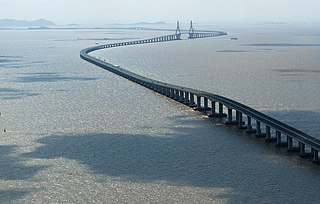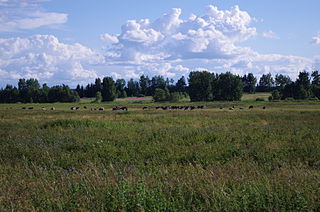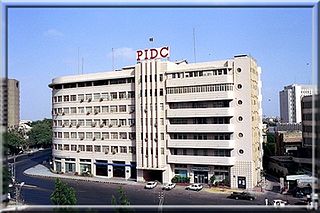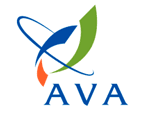
Science and technology in China have developed rapidly during the 1980s to 2010s, and major scientific and technological achievements have been made since the 1980s. From the 1980s to the 1990s, the Chinese government successively launched the "863 Plan" and the "Strategy for Rejuvenating the Country through Science and Education", which greatly promoted the development and progress of China's science and technology. The Chinese government has placed emphasis through funding, reform, and societal status on science and technology as a fundamental part of the socio-economic development of the country as well as for national prestige.
Technology transfer (TT), also called transfer of technology (TOT), is the process of transferring (disseminating) technology from the person or organization that owns or holds it to another person or organization, in an attempt to transform inventions and scientific outcomes into new products and services that benefit society. Technology transfer is closely related to knowledge transfer.
Science and technology in Israel is one of the country's most developed sectors. Israel spent 4.3% of its gross domestic product (GDP) on civil research and development in 2015, the highest ratio in the world. In 2019, Israel was ranked the world's fifth most innovative country by the Bloomberg Innovation Index. It ranks thirteenth in the world for scientific output as measured by the number of scientific publications per million citizens. In 2014, Israel's share of scientific articles published worldwide (0.9%) was nine times higher than its share of the global population (0.1%).

Tartu County is one of 15 counties of Estonia.

A science park is defined as being a property-based development that accommodates and fosters the growth of tenant firms and that is affiliated with a university based on proximity, ownership, and/or governance. This is so that knowledge can be shared, innovation promoted, technology transferred, and research outcomes progressed to viable commercial products. Science parks are also often perceived as contributing to national economic development, stimulating the formation of new high-technology firms, attracting foreign investment and promoting exports.
Agriculture and Agri-Food Canada is the department of the Government of Canada responsible for the federal regulation of agriculture, including policies governing the production, processing, and marketing of all farm, food, and agri-based products. Agriculture in Canada is a shared jurisdiction and the department works with the provinces and territories in the development and delivery of policies and programs.
Danish Committee for Aid to Afghan Refugees (DACAAR)(Danish: Den danske komité for hjælp til afghanske flygtninge) is a non-political, non-governmental, non-profit humanitarian and development organization working to improve the lives of the Afghan people since 1984.

The Bayh–Dole Act or Patent and Trademark Law Amendments Act is United States legislation permitting ownership by contractors of inventions arising from federal government-funded research. Sponsored by senators, Birch Bayh of Indiana and Bob Dole of Kansas, the Act was adopted in 1980, is codified at 94 Stat. 3015, and in 35 U.S.C. § 200–212, and is implemented by 37 C.F.R. 401 for federal funding agreements with contractors and 37 C.F.R 404 for licensing of inventions owned by the federal government.
The pharmaceutical industry is one of the leading industries in the People's Republic of China, covering synthetic chemicals and drugs, prepared Chinese medicines, medical devices, apparatus and instruments, hygiene materials, packing materials, and pharmaceutical machinery. China has the second-largest pharmaceutical market in the world as of 2017 which is worth US$110 billion. China accounts for 20% of the world's population but only a small fraction of the global drug market. China's changing health-care environment is designed to extend basic health insurance to a larger portion of the population and give individuals greater access to products and services. Following the period of change, the pharmaceutical industry is expected to continue its expansion.

Pakistan Industrial Development Corporation (PIDC) is a state corporation of Pakistan working under Ministry of Industries and Production. It was established in 1952. PIDC was created to set up industries in such fields where large capital was required and was difficult for the private sector and to set up industries in such backward areas to creating employment opportunities.

The Ministry of New and Renewable Energy (MNRE) is a ministry of the Government of India, headed by current Union Cabinet Minister Raj Kumar Singh, that is mainly responsible for research and development, intellectual property protection, and international cooperation, promotion, and coordination in renewable energy sources such as wind power, small hydro, biogas, and solar power.
The Bremen Overseas Research and Development Association (BORDA) is a non-profit international development organization headquartered in Bremen, Germany, and regional offices in Afghanistan, India, Indonesia, Mexico, and Tanzania as well as several project offices within each region. BORDA began its work in 1977, starting with its first project, “Technology Transfer of Biogas India-Ethiopia.” Since then it has been active in the delivery of basic needs services across the developing world.

The Agri-Food and Veterinary Authority of Singapore (AVA) was a statutory board under the Ministry of National Development that regulated food safety, safeguarded animal and plant health, and facilitated the agri-food and fisheries trade sectors. AVA was disbanded on 1 April 2019, with duties being transferred to other statutory boards, Singapore Food Agency, National Environment Agency, Health Sciences Authority, and National Parks Board.
The NIH Office of Technology Transfer (OTT) plays a strategic role by supporting the patenting and licensing efforts of our NIH ICs. OTT protects, monitors, markets and manages the wide range of NIH discoveries, inventions, and other intellectual property as mandated by the Federal Technology Transfer Act and related legislation.

The Science and Technology Information Center (STIC) is an Ethiopian organisation which provides information to support scientific and technological (S&T) activities in the country. STIC has published information on the financing of research and development and on the nature and progress of innovative projects, and in 2014 was planning to introduce bibliometric monitoring of publications in S&T. The center has also provided information and communications technology facilities including a digital library, a patent information system, an automated personnel management system, and a S&T-related database.
Innovation in Malaysia describes trends and developments in innovation in Malaysia.
Science and technology in Kazakhstan – government policies to develop science, technology and innovation in Kazakhstan.
Science and technology in Uzbekistan examines government efforts to develop a national innovation system and the impact of these policies.
The Ministry of SMEs and Startups is a ministry of the Republic of Korea, established in July 2017 by the Moon Jae-in government. It succeeds the former Small and Medium Business Administration. The headquarters are located in Sejong City, Sejong. As of February 2021, Lee Young, a member of the National Assembly and People Power Party, has been appointed as the South Korean Minister of SMEs and Startups.
In Ivory Coast, a country in West Africa, scientific output has been relatively modest. Scientists in Ivory Coast produced only 10 scholarly articles per million inhabitants in international journals in 2014, compared to a continental average of 20 per million. Between 2008 and 2014, scientists published mostly in biological sciences, followed by medical sciences, geosciences, agriculture and chemistry. The country also has few international collaborations, compared to the rest of the continent: whereas more than eight out of ten articles had a foreign co-author in most countries in 2014, the rate in Ivory Coast was 73%.








